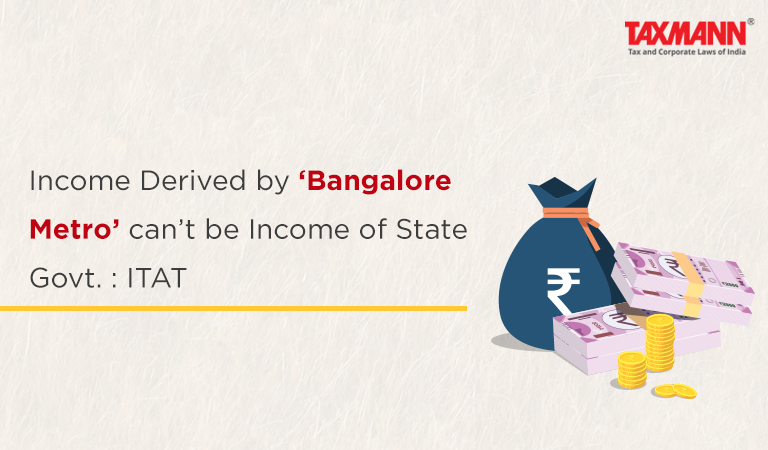Income Derived by ‘Bangalore Metro’ can’t be Income of State Govt. : ITAT
- News|Blog|Income Tax|
- 2 Min Read
- By Taxmann
- |
- Last Updated on 14 April, 2023

Case Details: Bangalore Metro Rail Corporation Ltd. v. DCIT - [2023] 149 taxmann.com 207 (Bangalore-Trib.)
Judiciary and Counsel Details
-
- N.V. Vasudevan, Vice-President & Chandra Poojari, Accountant Member
- Srihari Kutsa, A.R. for the Appellant.
- Sankar Ganesh K., D.R. for the Respondent.
Facts of the Case
The assessee was a Company wherein the Government of India held 50% of the shares and 50% held by the Government of Karnataka. The main object of the assessee was to establish, operate and maintain a Rapid Rail Transport system by constructing circular or other types of railway lines in and around Bangalore City.
Assessee contended it was acting as an extended arm of the State Government in establishing a rail-based rapid transport system. It should be treated as ‘State’ as it is an instrumentality and agency of the State Government. Therefore, its income cannot be brought to tax in view of Article 289 of the Constitution of India.
The matter reached the Bangalore Tribunal.
ITAT Held
The Tribunal held that the exemption from taxation is available to the income of a State and not the income of the instrumentality or agency of a State. The assessee was not performing a sovereign function of the Government as the private parties could also carry on the activity of Rail transport.
Assessee was carrying on the activity of railway transport of passengers, i.e., an independent corporation managed by a Board of Directors. The ticket price has been fixed by the Corporation, not at a cost-to-cost price, and it has been fixed with an element of profit. It was not functioning under the policy of no profit and no loss.
Transporting passengers by rail is to be considered a business activity. The activity carried on by the assessee is nowhere different from that one carried on by private entrepreneurs. It is always the business activity of the assessee company with a profit motive.
Further, the control or directions issued by the State Government would not change the character of “business activity”. The “ownership of the Corporation” and “activities of the Corporation” are two different aspects, and the ownership cannot be considered or taken into account to determine the character or nature of the activities carried on by the Corporation.
The assessee is a separate personality of its own, incorporated under the Companies Act for carrying on the business activity, and the profit or loss arising from there are the profit and loss of the Corporation itself. Thus, the income derived from the Corporation from the business activities cannot be said to be an income of the Karnataka State Government.
Therefore, the assessee cannot be considered a part of the Government department immune from Union Taxation.
Disclaimer: The content/information published on the website is only for general information of the user and shall not be construed as legal advice. While the Taxmann has exercised reasonable efforts to ensure the veracity of information/content published, Taxmann shall be under no liability in any manner whatsoever for incorrect information, if any.

Taxmann Publications has a dedicated in-house Research & Editorial Team. This team consists of a team of Chartered Accountants, Company Secretaries, and Lawyers. This team works under the guidance and supervision of editor-in-chief Mr Rakesh Bhargava.
The Research and Editorial Team is responsible for developing reliable and accurate content for the readers. The team follows the six-sigma approach to achieve the benchmark of zero error in its publications and research platforms. The team ensures that the following publication guidelines are thoroughly followed while developing the content:
- The statutory material is obtained only from the authorized and reliable sources
- All the latest developments in the judicial and legislative fields are covered
- Prepare the analytical write-ups on current, controversial, and important issues to help the readers to understand the concept and its implications
- Every content published by Taxmann is complete, accurate and lucid
- All evidence-based statements are supported with proper reference to Section, Circular No., Notification No. or citations
- The golden rules of grammar, style and consistency are thoroughly followed
- Font and size that’s easy to read and remain consistent across all imprint and digital publications are applied



 CA | CS | CMA
CA | CS | CMA
